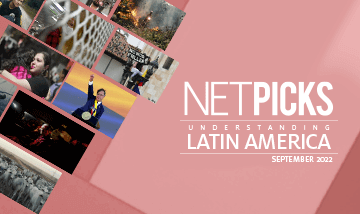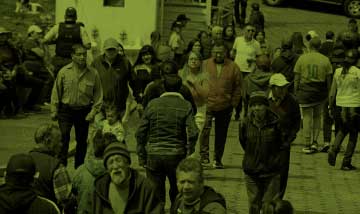Índice
- COLOMBIA’S LEFTWING GOVERNMENT UNVEILS TAX-THE-RICH PLAN TO TACKLE POVERY
- AYOTZINAPA CASE: KEY POINTS TO UNDERSTAND THE MEXICAN GOVERNMENT’S NEW ACTIONS
- GUATEMALA’S WAR ON TRUTH
- THE FRONT LINES AT THE END OF THE WORLD – AND THE FIGHT TO SAVE THE AMAZON
- UNDERSTANDING WHY CHILEANS REJECTED THE NEW CONSTITUTION
Understanding Latin America
Dear readers and colleagues, this month we bring you five articles that reflect the reality of Latin America: one each from Colombia, Mexico, Guatemala, Brazil and two on Chile’s constitutional plebiscite.
- Colombia’s Leftwing Government Unveils Tax-The-Rich Plan To Tackle Povery
- Ayotzinapa Case: Key Points To Understand The Mexican Government’s New Actions
- Guatemala’s War On Truth
- The Front Lines At The End Of The World – And The Fight To Save The Amazon
- Understanding why chileans rejected the new constitution
.
COLOMBIA’S LEFTWING GOVERNMENT UNVEILS TAX-THE-RICH PLAN TO TACKLE POVERY
Less than a month of being sworn in as Colombian president, Gustavo Petro, unveils a new plan to tax the rich in effort to combat poverty in the country. The announcement appears to show that Colombia’s first leftist leader plans to fulfill one of his biggest campaign promises. If passed, the plan will implement progressive taxation that increases as income increase, including raising taxes on the country’s highest earners, some 2% of the population. It will also cut tax benefits for the richest, fight tax evasion, add an annual wealth tax on savings and property over US$630,000 and add a 10% tax on some of Colombia’s biggest exports, including oil, coal and goal. The proposed reforms are expected to raise some US$11.5 billion annually to fund anti-poverty efforts, public universities and other social welfare programs, says President Petro. The tax plan has been praised by supporters, saying countries around the world should be considering similar reforms to tackle rising global inequality. The announcement has prompted alarm with the country’s private sector and political elite who argue the reforms will dissuade investment and push job creators out of the country. Former right-wing president Alvaro Uribe, accused of fraud and bribery, says these new tax measures will deepen poverty.
Megan Janetsky, Aug 26, 2022.
https://www.theguardian.com/world/2022/aug/26/colombia-tax-the-rich-plan-poverty-gustavo-petro
.
AYOTZINAPA CASE: KEY POINTS TO UNDERSTAND THE MEXICAN GOVERNMENT’S NEW ACTIONS
September 26 will mark eight years since Mexican security forces and armed groups disappeared 43 students from the Ayotzinapa teaching school in Iguala, Mexico. The forced disappearances have attracted attention by international human rights groups, and become an important case highlighting the state’s active role in carrying out human rights violations in the country. In August, a new report released by the Commission for Truth and Access to Justice in the Ayotzinapa case (Comisión para la Verdad y Acceso a la Justicia del caso Ayotzinapa, COVAJ) has revealed even more damning evidence against the state, including proof that the army had been tracking the students via undercover agents (now amongst the missing) in the school. It also provided enough evidence to arrest former Attorney General Jesús Murillo Karam and 83 other military commanders and troops for their role in the disappearance and cover up. Since the killings occurred in 2014, a number of inconsistencies have been revealed in the state’s version of events, including the total fabrication of details of what happened known as the “historic truth” invented by various officials in then-President Enrique Peña Nieto’s administration. When President Andrés Manuel López Obrador took office in 2018, he created the Commission for Truth and Access to Justice in the Ayotzinapa case (Comisión para la Verdad y Acceso a la Justicia del caso Ayotzinapa, COVAJ) with the purpose of providing truth and justice to the families. Read bellow for other striking revelations by COVAJ.
Stephanie Brewer, Aug 31, 2022.
https://www.wola.org/analysis/ayotzinapa-key-points-understand-mexican-governments-new-actions/
.
GUATEMALA’S WAR ON TRUTH
Renowned Guatemalan journalist José Rubén Zamora, president and founder of the investigative newspaper elPeriódico, has been detained for over a month after masked officials raided his home on July 29th and took him away. The newspaper offices were also raided the same afternoon. The author explains that Zamora’s arrest is part of a brutal repression against journalists and human rights defenders by President Alejandro Giammattei, who’s been repeatedly accused of corruption by elPeriódico and a variety of other independent news outlets. elPeriódico has also exposed cases of corruption of several high ranking figures in President Giammettei’s government, including Attorney General Consuelo Porras and Rafael Curruchiche, who last year was appointed head of the Special Prosecutor’s Office Against Impunity (FECI). Zamora was arrested on charges of alleged money laundering, blackmail, and influence peddling. His next hearing is scheduled in December. Community journalists say this repression goes back to at least 2012, since the influx of partnerships between local governments and multinational corporations for the creation of mining projects, oil palm plantations and other investments. Their reporting on the dire environmental and social impacts of these projects have led to militarization of the area, killings and imprisonment of local journalists. But human rights observers are concerned about the repression of dissenting voices in Central America in general, with El Salvador and Nicaragua showing similar patterns.
María Inés Taracena, Aug 23, 2022.
https://www.thenation.com/article/world/guatemala-journalist-arrest/
.
THE FRONT LINES AT THE END OF THE WORLD – AND THE FIGHT TO SAVE THE AMAZON
The author reviews a new documentary by director Alex Pritz called “The Territory,” which takes a close-up look at the destruction of the Amazon rainforest. The filmmaker and his crew spent three years on the southern edge of Brazil’s Amazon rainforest, starting in 2018, just as Bolsonaro, in the name of economic development, was campaigning on promises to roll back Indigenous rights and empower settlers to travel to the Amazon to make the rainforest productive. The call emboldened miners, ranchers and loggers to do just that. As a result, Brazil’s Amazon has seen some of the highest deforestation rates in the country’s history and increased conflicts with Indigenous communities across the rainforest. Settlers are featured in the film, explaining their vision to develop the Amazon rather than leaving the valuable resources there untouched in a time of dire economic need, when Brazilians are feeling particularly desperate. But the film focuses on the Uru-Eu-Wau-Wau Indigenous people and their fight to fend off this development. This includes using their highly modern equipment like drones, cameras, GPS trackers to document and report invasions to authorities, while explaining to audiences their hopeful vision for the future. The release of the film comes just ahead of Brazil’s highly-polarized presidential elections in October, where Bolsonaro has his hat in the ring for re-election. Environmental and Indigenous concerns remain in the spotlight, particularly following the recent assassinations of British journalist Dom Phillips and Brazilian Indigenous expert Bruno Pereira some 500 miles northwest of where the documentary was shot. The two were there were investigating similar surveillance tactics being implemented by other Amazon communities. “The Territory” is currently showing in select U.S. and Canadian cities.
Andrew Fishman, Aug 28, 2022.
https://theintercept.com/2022/08/28/territory-movie-amazon-brazil/
.
UNDERSTANDING WHY CHILEANS REJECTED THE NEW CONSTITUTION
You’ve probably heard about Chile’s historic vote earlier this month, in which the majority of the population voted against the new constitution that had been praised as extending rights for women, nature, Indigenous communities and democracy itself. Here, we bring you two articles analyzing the outcome. The first is by the Rosa Luxemburg Foundation´s office in Buenos Aires who argue that Chileans made it clear they don’t want the new constitution, but they don’t want the old one either. To understand why the new constitution was rejected, the left need to look at their own shortcomings in the process of creating and promoting the text. This process began as a vibrant debate in assemblies across the country, but the final text ended-up confined to decision makers in the capital. But, we also need to really understand the strategy of the right in delegitimizing the constitutional convention process. In an opinion piece by Chilean-American writer Ariel Dorfman, the author expresses his remorse about the constitutional rejection, as it indicates that the majority of Chileans are not ready for such drastic progressive changes outlined in the text. Though the country has missed a unique chance to finally bury the authoritarian Pinochet constitution, the author is convinced that a new constitution will eventually be adopted. Read the following pieces to find out why these authors are still hopeful a new text will be passed, and the challenges that lie ahead.
UNDERSTANDING WHY CHILEANS REJECTED THE NEW CONSTITUTION
Rosa Luxemburg Foundation’s Buenos Aires Office, Sept 9, 2022.
https://www.rosalux.de/en/news/id/46980
CHILEANS REJECTED THE NEW CONSTITUTION, BUT THEY STILL WANT PROGRESSIVE REFORMS
Ariel Dorfman, Sept 6, 2022.
https://www.theguardian.com/commentisfree/2022/sep/06/chile-new-constitution-reject-pinochet





